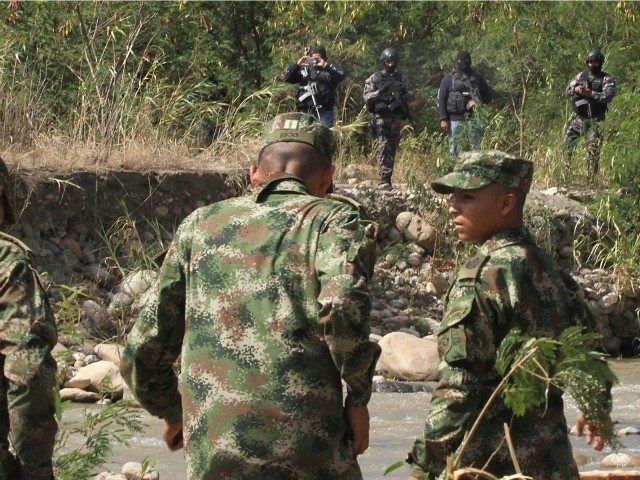The Venezuelan navy violated the sovereignty of neighboring Colombia on Saturday night, as armed navy sailors crossed the border by the Colombian town of Arauquita, storming a night club and terrorizing beachgoers.
While the Venezuelan government has yet to make any official statement on the matter, Colombian officials report that armed Venezuelan servicemen appeared to be chasing suspects aboard a canoe on the Arauca River, an official border crossing between the two nations. In chasing the suspects, the Venezuelan sailors crossed onto Colombian land and entered an establishment called “Beach Bar” (“Playa Bar”), in an area known as Beach B. Here the soldiers came across Colombian policemen, who exchanged fire with the Venezuelans until they returned to their side of the border. No injuries were reported.
One of the patrons of Beach Bar attempted to record the incident on a cellular phone, so footage of the incident has surfaced on Youtube. In the video, it is clear that those inside the bar had ducked under tables waiting for the gunfire to cease. The camera catches the sound of a woman crying, while the men in the bar encourage Colombian police to “give them lead.”
“Venezuelan sons of bitches,” one man can be heard saying. “That’s what you have to do with them.”
The incident ended when the Venezuelan servicemen turned around and returned to their border. [Warning: profane language in Spanish]
The Colombian government has issued a statement saying that officials have reached out to the socialist government in Caracas for an explanation of how those Venezuelan sailors got across the border. Colombia demands Venezuela “clarify the circumstances … and take the actions necessary” to prevent a repeat incident. The Colombian Foreign Ministry also announced it was in contact with Venezuelan officials in Apure State, where the border crossing took place, hoping to enhance security on the border and prevent Venezuelans from crossing it again.
Apure is the third state in which Venezuelan socialist President Nicolás Maduro has forced a hard closure of the border, announcing in September that alleged smuggling by Colombian criminals was damaging Venezuela’s economy to such an extent that his government would have to halt all traffic between the borders of both nations. Maduro previously shut down the borders of Zulia and Táchira states, the latter a hub for peaceful, anti-socialist protests throughout 2014.
In the process of shutting the borders, Maduro ordered the forced deportation of 20,000 Colombians legally residing on the Venezuelan side of the border. Officers violently removed Colombian nationals from their homes, often in front of their mixed-nationality children, and spray-painted the letter “D,” for “demolish,” on their homes. The government then confiscated the homes.
“Just as they did in the Nazi ghettos, they [the government] marked [Colombian] family homes with a ‘D’ for ‘demolish,’” Colombian President Juan Manuel Santos said of the raids at the time, pleading for support from Colombia’s Latin American neighbors. “The question we have today is, ‘Where is our region?’” Santos eventually met with Maduro in September 2015, and the nations agreed to allow Colombian nationals who had been deported to return to Venezuela. The Venezuelan government never addressed the fate of the property confiscated from those deported and never reopened the border.

COMMENTS
Please let us know if you're having issues with commenting.